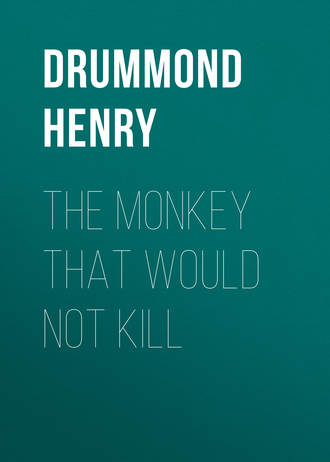
Drummond Henry
The Monkey That Would Not Kill
CHAPTER IV
For three days after the monkey had been 'hanged' it did not come near the shepherd or his house. A monkey has feelings. To be nearly hanged is bad enough, but to have a boa-constrictor and a pump-handle tied to your neck is more than any self-respecting animal would stand. So Tricky devoted himself exclusively to the sheep. For the space of three days, with the invaluable aid of the pump-handle, Tricky shepherded that flock. Not a blade of grass was nibbled during this period; one prolonged stampede was kept up night and day. The lambs dropped with hunger. The old sheep tottered with fatigue. The whole flock was demoralised. In fact, when the 'Reign of Terror' closed there was not a pound of sound mutton left on the island.
Why did not the shepherd interfere? Because, as we shall see, for these three days he had more urgent work to do. When the shepherd's wife went out to the pump that morning for water to make the porridge with, she found it a heap of ruins. She came back and broke the tidings to the shepherd, and said she believed it had been struck with lightning. The shepherd discreetly said nothing, but presently stole sullenly out to inspect the damage once more. It was worse than he thought. A pump must hold in both air and water; this pump was rent and split in a dozen places. There was no water either to drink or make the porridge with, till the tube was mended. So all that day the shepherd was splicing, and hammering, and gluing, and bandaging. All the next day he was doing the same. He got nothing to eat or drink; nobody got anything to eat or drink. The poor children were kept alive on a single bowlful, which happened to be in the house, but this was now finished, and they were crying out from want. Positively, if this drought and famine had been kept up for a few days more the island would certainly have been restored to the condition described on the chart – 'uninhabited.'
On the morning of the fourth day the pump stood erect, and wind and water-tight once more. Only one thing was wanting – there was no handle. The only thing left was to try to catch Tricky, for there was nothing else on the island which would make a handle. But just then Tricky required no catching. At that moment he was sitting on the doorstep contemplating the group round the pump. Everybody being out, he had seized the opportunity to have a good breakfast – consisting of every particle of meal in the barrel – and was now enjoying a period of repose before recommencing hostilities. The shepherd made a rush at him, but, alas, what he wanted was no longer there. A piece of frayed rope dangled on its neck, but the pump-handle was gone.
It took two days more to find it. Every inch of the island was patiently examined. Even the child next the baby had to join in the search. Night and day they were all at it; and at last it was found by the shepherd's wife – stuck in a rabbit-hole. All this time no one had leisure to kill Tricky. But on the seventh day the shepherd rose with murder written on his brow. The monkey would not shoot, and he would not hang; it remained to try what drowning would do. So he tied a large stone round the monkey's neck, and led him forth to the edge of the great sea-cliff.
A hundred feet below, the sea lay like a mirror; and the shepherd, as he looked over for a deep place, saw the great fronds of the sea-weeds and the jelly-fish and the anemones lying motionless in the crystal waters. Then he took the monkey and the stone in his great hands, examined the knots hastily, and, with one sudden swing, heaved them over the cliff.
The shepherd would much rather at this point have retired from the scene. But he dared not. He could not trust that monkey. An actual certificate of death was due to himself and to his family. So he peered over the cliff and saw the splash in the sea, and watched the ripples clearing off till the sea-bottom stood out again with every shell distinct. And there, sure enough, was Tricky, down among the star-fish, safely moored to his gravestone, and the yard of good rope holding like a chain-cable. The shepherd rose for the first time since that monkey set foot upon the island and breathed freely. Then he slowly went back to the house and told the tale of the end of Tricky.
It was not till midnight that Tricky came back. Of course you knew Tricky would come back. You knew the rope would slip over the stone, or break, or be eaten through by a great fish, or something, and, though none of these things happened, it is certainly true that that night at midnight Tricky did turn up. Perhaps I should say turn down, for he came in, as usual, by the chimney. But the exact way in which this singular creature escaped from its watery grave must be reserved for another chapter.
CHAPTER V
If the shepherd had stood looking over the cliff for one moment longer he would have witnessed a curious scene. Every schoolboy knows that a stone is lighter in water than in air. How the monkey knew this, or whether he did or did not, it is impossible to say, but his actions were certainly those of a philosopher. For, instead of resigning himself to his fate, he bent down and grasped the stone which held him to his watery grave, picked it up in his arms, and walked calmly along the bottom towards the shore. With a supreme effort he next got the stone edged on to a half-submerged ledge; but now that it was half out of the water it was once more too heavy to lift, and Tricky lay in great perplexity in the shallow water, wondering how ever he was to get out of this fresh dilemma. There appeared nothing for it but to attack the rope with his teeth, and for an hour Tricky worked at the tough strands, but without almost any success. After another hour's work the monkey made an appalling discovery. When he began work, the water was only up to his knees; and to his consternation, it now covered him up to his middle. In a short time more it came up to his neck, and it was clear to Tricky that if the ledge went on sinking at this rate he was a dead monkey. Tricky thought he knew all about the sea, but in the foreign sea, where he had lived with the missionary, there were no tides, and this creeping in of the water greatly disturbed his peace of mind. To his great joy, however, he found that the stone, now wholly covered with water, was once more light enough to lift, and he trundled it along the ledge till the water became too shallow to move it further. Just above this point was another ledge, high and dry above tide-mark, and the yard of rope was just long enough to allow the monkey to take up his position there, and shake himself dry in the sun.
Now, this shaking process suggested an idea to Tricky – a very obvious one to you or me, but a real inspiration to a monkey. Tricky noticed that the very part of the rope where he had been gnawing rested against the sharp edge of the rocky ledge, and that one frayed strand had suddenly parted while he was shaking himself. The rock-edge, in fact, was a regular knife, and after much and hard rubbing, and many rests, Tricky found himself within three or four strands of freedom. It was all but midnight when the last strand parted, and in a few minutes more the gallant monkey crawled up the cliff and stood once more at the door of his executioner's house.
I am afraid you will be as much surprised as Tricky was at the startling discovery he made when he got there. The cottage was on fire! For days, you will remember, there had been no food in the shepherd's home. But that day the family had celebrated the mending of the pump by a great banquet and a washing. Such a fire was lit as had not blazed on the hearth for years, and when it grew dark the red sparks flew into the air and fell in dangerous showers upon the dry thatched roof. The wind, too, rose about nightfall, and fanned one smouldering square of turf into life; and when Tricky reached the spot at least half the roof was already in a blaze. But Tricky was hungry after his day's adventures, and the chimney end of the roof being still untouched by the fire, he jumped on to the roof and down into the kitchen with a bound. The baby's cradle lay, as usual, close to the side of the fire, and the monkey, in passing, must have swished it with his tail, for the infant broke into a sudden yell, which rang through the room, and woke the shepherd with a start. The good man was awake not a moment too soon. Had the monkey arrived five minutes later the whole family must have perished; the smoke had already filled the other room, and was pouring in, in rolling clouds, below the kitchen door. With one thunderstruck glare at the night-watchman who had wakened him so opportunely – and who now occupied his usual throne on the meal-barrel, violently sneezing out smoke, and wondering whether it was not better to be drowned – the shepherd rushed towards the door to save the two elder children who lay locked in slumber in the burning room beyond. Seizing them in his arms, he bore them safely to the open air, and then returned for his wife and the other children. Tricky followed at their heels; and the next moment the rescued family stood in a shivering group, helplessly watching the flames. The roof soon fell in, and in the morning all that remained of the shepherd's house was a few charred rafters.
On the spot where the shepherd's cottage was burned now stands a noble lighthouse. It was put up a few months after the fire, and one of the three lighthouse-keepers is the shepherd. The second is a man who is fond of telling tales of the sea, and how he was once mate of a ship called the Vulcan. The third keeper of the lighthouse is a quadruped called Tricky. The affection between him and the ex-shepherd is peculiar. Other people think there is some history connected with it, but the shepherd never says much. When asked if it is really true that the monkey cannot be killed, he always replies, 'Yes; but that is not why it is alive.' Only on one occasion was the shepherd known to add anything to that remark. It was one night when Tricky had held back the baby – it had just learned to creep – from tumbling over the cliff. Then the shepherd smiled as he threw Tricky a whole bagful of nuts, and said, 'That monkey won't kill – nor let anybody else kill.'



